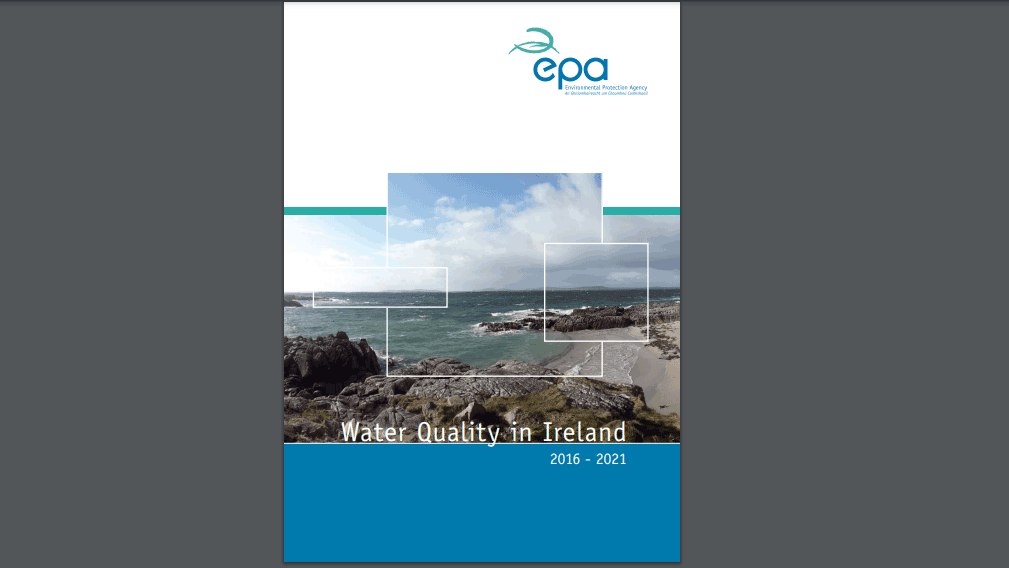The Sustainable Water Network (SWAN), a network of twenty five of Ireland’s leading environmental organisations, reacted to today’s EPA Water Quality report by calling on Government to come up with an effective plan to address Ireland’s escalating water pollution crisis.
The report highlights that almost half (46%) our surface waters are unhealthy, and trending in wrong direction with our estuaries declining by an alarming 16% and our coastal waters declining 10%. This shows the complete lack of progress that’s been made restoring our polluted waters.
The report further highlights that nearly half of our rivers (43%), mostly in the south and southeast of the country, are below healthy levels for nitrogen while nearly a third of rivers (30%) and a third of lakes (33%) are failing for phosphorus concentrations. Concentrations of nitrogen in particular has increased substantially across our rivers, and estuaries, with these declines clearly coinciding with areas of increased intensive dairy farming.
Our water environment’s depleted state in turn lead to a loss of the wildlife that relies on a healthy water environment, such as our iconic salmon and much-loved kingfisher. This failure also has a negative impact on our own health: pollution regularly contaminates the water we source for drinking and that we swim in; while the waterscapes that have been so important for our wellbeing in the past three years are being allowed to languish and decline.
The 3-yearly EPA water quality report acts as a rigorous assessment of the government water management strategy: The data published today clearly shows that this has failed to address the damaging impacts of agriculture, waste water, forestry, unregulated land drainage and river alterations. It therefore serves as both evidence and alarm-call that a change of approach is urgently needed.
The government has a golden opportunity to fix this now. It is currently finalising the 2022-2027 River Basin Management Plan1. This is required under the EU Water Framework Directive2 to lay out how we will restore our inland and coastal waters to a healthy state3 by the mandatory deadline of 2027. However, the plan in its draft form is much too weak, and is completely lacking in the ambition and targeted actions needed to tackle pollution.
Sinéad O’Brien, SWAN Coordinator, said: “This report has revealed yet again the ongoing failure of government to address this crisis and to stem the tide of water pollution. Local success stories are a tribute to the communities who have taken their local waterbody to their hearts but nationally these are massively over-shadowed by escalating pollution and physical damage from agricultural intensification, poorly managed forestry, lack of regulation of river and land drainage and continued pollution from out-of-date sewerage systems.
This has not happened by accident. The State’s policy for, and promotion of, aggressive agricultural expansion and intensification, particularly in the dairy sector, runs contrary to the ever-growing body of evidence showing the drastic impacts this is having on our rivers, lakes and coasts, especially in vulnerable catchments. Since 2013, the dairy herd has increased by 40%4 and over this period there has been significant increases in agricultural pollutants particularly in the south east of the country where dairy intensification is most prominent. Moreover, successive governments have neglected again and again to invest in the infrastructure needed to prevent the discharge of raw and inadequately treated sewage into our waters and the sensitive habitats and species they support.
“The government now has a perfect opportunity to fix the issues highlighted in the EPA report in the upcoming River Basin Management Plan. This must challenge the fundamental mismatch between current land-use policy and the legal requirements of the WFD while introducing robust controls to halt and reverse pollution from agriculture, forestry and sewage; along with proper regulation of land and river drainage. To rise to this challenge will require a substantial re-write of the deeply disappointing business-as-usual draft plan which was heavily criticised by the 1,000+ respondents to the public consultation earlier this year.”
With the final River Basin Management Plan due before the end of the year, SWAN is calling on the government to introduce site-specific risk assessments for intensive farms and afforestation in vulnerable catchments; measures to fix discharges in the 200+ waterbodies heavily polluted by sewage; a ban on wetland drainage; reform of the Arterial Drainage Act and a national wetland restoration plan.
These recommendations, along with others, are included in a detailed SWAN submission to the government’s draft plan5.
Notes:
1 The Draft 3rd River Basin Management Plan (RBMP) – https://assets.gov.ie/199144/7f9320da-ff2e-4a7d-b238-2e179e3bd98a.pdf
2 The EU Water Framework Directive – https://ec.europa.eu/environment/water/water-framework/index_en.html
3 The Water Framework Directive requires “good status” or “high status” classification for all waters by 2027.
4 CSO Crops and Livestock Provisional June 2013 – https://www.cso.ie/en/releasesandpublications/er/clsjf/cropsandlivestocksurveyjunefinal2013/
CSO Crops and Livestock Provisional June 2022 – https://www.cso.ie/en/releasesandpublications/ep/p-clsjp/cropsandlivestockprovisionaljune2022/
5 SWAN’s submission to the draft River Basin Management Plan (RBMP) – https://swanireland.ie/wp-content/uploads/2022/04/SWAN-Response-to-3rd-River-Basin-Management-Plan-RBMP-Consultation.pdf

